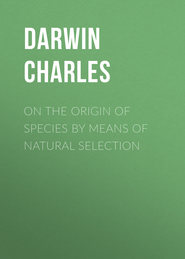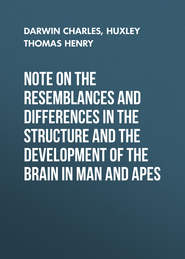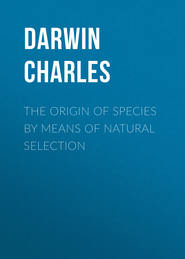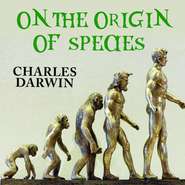По всем вопросам обращайтесь на: info@litportal.ru
(©) 2003-2025.
✖
Life and Letters of Charles Darwin — Volume 1
Настройки чтения
Размер шрифта
Высота строк
Поля
[The following extracts from letters to Mr. Fox are worth giving, as showing how great was the accumulation of material which now had to be dealt with.
June 14th [1856].
"Very many thanks for the capital information on cats; I see I had blundered greatly, but I know I had somewhere your original notes; but my notes are so numerous during nineteen years' collection, that it would take me at least a year to go over and classify them."
November 1856.
"Sometimes I fear I shall break down, for my subject gets bigger and bigger with each month's work."]
CHARLES DARWIN TO C. LYELL Down, 16th [June, 1856].
My dear Lyell,
I am going to do the most impudent thing in the world. But my blood gets hot with passion and turns cold alternately at the geological strides, which many of your disciples are taking.
Here, poor Forbes made a continent to [i.e., extending to] North America and another (or the same) to the Gulf weed; Hooker makes one from New Zealand to South America and round the World to Kerguelen Land. Here is Wollaston speaking of Madeira and P. Santo "as the sure and certain witnesses of a former continent." Here is Woodward writes to me, if you grant a continent over 200 or 300 miles of ocean depths (as if that was nothing), why not extend a continent to every island in the Pacific and Atlantic Oceans? And all this within the existence of recent species! If you do not stop this, if there be a lower region for the punishment of geologists, I believe, my great master, you will go there. Why, your disciples in a slow and creeping manner beat all the old Catastrophists who ever lived. You will live to be the great chief of the Catastrophists.
There, I have done myself a great deal of good, and have exploded my passion.
So my master, forgive me, and believe me, ever yours, C. DARWIN.
P.S. Don't answer this, I did it to ease myself.
CHARLES DARWIN TO J.D. HOOKER. Down [June] 17th, 1856.
...I have been very deeply interested by Wollaston's book ('The Variation of Species,' 1856.), though I differ GREATLY from many of his doctrines. Did you ever read anything so rich, considering how very far he goes, as his denunciations against those who go further: "Most mischievous," "absurd," "unsound." Theology is at the bottom of some of this. I told him he was like Calvin burning a heretic. It is a very valuable and clever book in my opinion. He has evidently read very little out of his own line. I urged him to read the New Zealand essay. His Geology also is rather eocene, as I told him. In fact I wrote most frankly; he says he is sure that ultra-honesty is my characteristic: I do not know whether he meant it as a sneer; I hope not. Talking of eocene geology, I got so wrath about the Atlantic continent, more especially from a note from Woodward (who has published a capital book on shells), who does not seem to doubt that every island in the Pacific and Atlantic are the remains of continents, submerged within period of existing species, that I fairly exploded, and wrote to Lyell to protest, and summed up all the continents created of late years by Forbes (the head sinner!) YOURSELF, Wollaston, and Woodward, and a pretty nice little extension of land they make altogether! I am fairly rabid on the question and therefore, if not wrong already, am pretty sure to become so...
I have enjoyed your note much. Adios, C. DARWIN.
P.S. [June] 18th. Lyell has written me a CAPITAL letter on your side, which ought to upset me entirely, but I cannot say it does quite.
Though I must try and cease being rabid and try to feel humble, and allow you all to make continents, as easily as a cook does pancakes.
CHARLES DARWIN TO C. LYELL. Down, June 25th [1856].
My dear Lyell,
I will have the following tremendous letter copied to make the reading easier, and as I want to keep a copy.
As you say you would like to hear my reasons for being most unwilling to believe in the continental extensions of late authors, I gladly write them, as, without I am convinced of my error, I shall have to give them condensed in my essay, when I discuss single and multiple creation; I shall therefore be particularly glad to have your general opinion on them. I may QUITE LIKELY have persuaded myself in my wrath that there is more in them than there is. If there was much more reason to admit a continental extension in any one or two instances (as in Madeira) than in other cases, I should feel no difficulty whatever. But if on account of European plants, and littoral sea shells, it is thought necessary to join Madeira to the mainland, Hooker is quite right to join New Holland to New Zealand, and Auckland Island (and Raoul Island to N.E.), and these to S. America and the Falklands, and these to Tristan d'Acunha, and these to Kerguelen Land; thus making, either strictly at the same time, or at different periods, but all within the life of recent beings, an almost circumpolar belt of land. So again Galapagos and Juan Fernandez must be joined to America; and if we trust to littoral see shells, the Galapagos must have been joined to the Pacific Islands (2400 miles distant) as well as to America, and as Woodward seems to think all the islands in the Pacific into a magnificent continent; also the islands in the Southern Indian Ocean into another continent, with Madagascar and Africa, and perhaps India. In the North Atlantic, Europe will stretch half-way across the ocean to the Azores, and further north right across. In short, we must suppose probably, half the present ocean was land within the period of living organisms. The Globe within this period must have had a quite different aspect. Now the only way to test this, that I can see, is to consider whether the continents have undergone within this same period such wonderful permutations. In all North and South and Central America, we have both recent and miocene (or eocene) shells, quite distinct on the opposite sides, and hence I cannot doubt that FUNDAMENTALLY America has held its place since at least, the miocene period. In Africa almost all the living shells are distinct on the opposite sides of the inter-tropical regions, short as the distance is compared to the range of marine mollusca, in uninterrupted seas; hence I infer that Africa has existed since our present species were created. Even the isthmus of Suez and the Aralo-Caspian basin have had a great antiquity. So I imagine, from the tertiary deposits, has India. In Australia the great fauna of extinct marsupials shows that before the present mammals appeared, Australia was a separate continent. I do not for one second doubt that very large portions of all these continents have undergone GREAT changes of level within this period, but yet I conclude that fundamentally they stood as barriers in the sea, where they now stand; and therefore I should require the weightiest evidence to make me believe in such immense changes within the period of living organisms in our oceans, where, moreover, from the great depths, the changes must have been vaster in a vertical sense.
SECONDLY.
Submerge our present continents, leaving a few mountain peaks as islands, and what will the character of the islands be, — Consider that the Pyrenees, Sierra Nevada, Apennines, Alps, Carpathians, are non-volcanic, Etna and Caucasus, volcanic. In Asia, Altai and Himalaya, I believe non-volcanic. In North Africa the non-volcanic, as I imagine, Alps of Abyssinia and of the Atlas. In South Africa, the Snow Mountains. In Australia, the non-volcanic Alps. In North America, the White Mountains, Alleghanies and Rocky Mountains — some of the latter alone, I believe, volcanic. In South America to the east, the non-volcanic [Silla?] of Caracas, and Itacolumi of Brazil, further south the Sierra Ventanas, and in the Cordilleras, many volcanic but not all. Now compare these peaks with the oceanic islands; as far as known all are volcanic, except St. Paul's (a strange bedevilled rock), and the Seychelles, if this latter can be called oceanic, in the line of Madagascar; the Falklands, only 500 miles off, are only a shallow bank; New Caledonia, hardly oceanic, is another exception. This argument has to me great weight. Compare on a Geographical map, islands which, we have SEVERAL reasons to suppose, were connected with mainland, as Sardinia, and how different it appears. Believing, as I am inclined, that continents as continents, and oceans as oceans, are of immense antiquity — I should say that if any of the existing oceanic islands have any relation of any kind to continents, they are forming continents; and that by the time they could form a continent, the volcanoes would be denuded to their cores, leaving peaks of syenite, diorite, or porphyry. But have we nowhere any last wreck of a continent, in the midst of the ocean? St. Paul's Rock, and such old battered volcanic islands, as St. Helena, may be; but I think we can see some reason why we should have less evidence of sinking than of rising continents (if my view in my Coral volume has any truth in it, viz.: that volcanic outbursts accompany rising areas), for during subsidence there will be no compensating agent at work, in rising areas there will be the ADDITIONAL element of outpoured volcanic matter.
THIRDLY.
Considering the depth of the ocean, I was, before I got your letter, inclined vehemently to dispute the vast amount of subsidence, but I must strike my colours. With respect to coral reefs, I carefully guarded against its being supposed that a continent was indicated by the groups of atolls. It is difficult to guess, as it seems to me, the amount of subsidence indicated by coral reefs; but in such large areas as the Lowe Archipelago, the Marshall Archipelago, and Laccadive group, it would, judging, from the heights of existing oceanic archipelagoes, be odd, if some peaks of from 8000 to 10,000 feet had not been buried. Even after your letter a suspicion crossed me whether it would be fair to argue from subsidences in the middle of the greatest oceans to continents; but refreshing my memory by talking with Ramsay in regard to the probable thickness in one vertical line of the Silurian and carboniferous formation, it seems there must have been AT LEAST 10,000 feet of subsidence during these formations in Europe and North America, and therefore during the continuance of nearly the same set of organic beings. But even 12,000 feet would not be enough for the Azores, or for Hooker's continent; I believe Hooker does not infer a continuous continent, but approximate groups of islands, with, if we may judge from existing continents, not PROFOUNDLY deep sea between them; but the argument from the volcanic nature of nearly every existing oceanic island tell against such supposed groups of islands, — for I presume he does not suppose a mere chain of volcanic islands belting the southern hemisphere.
FOURTHLY.
The supposed continental extensions do not seem to me, perfectly to account for all the phenomena of distribution on islands; as the absence of mammals and Batrachians; the absence of certain great groups of insects on Madeira, and of Acaciae and Banksias, etc., in New Zealand; the paucity of plants in some cases, etc. Not that those who believe in various accidental means of dispersal, can explain most of these cases; but they may at least say that these facts seem hardly compatible with former continuous land.
FINALLY.
For these several reasons, and especially considering it certain (in which you will agree) that we are extremely ignorant of means of dispersal, I cannot avoid thinking that Forbes' 'Atlantis,' was an ill-service to science, as checking a close study of means of dissemination. I shall be really grateful to hear, as briefly as you like, whether these arguments have any weight with you, putting yourself in the position of an honest judge. I told Hooker that I was going to write to you on this subject; and I should like him to read this; but whether he or you will think it worth time and postage remains to be proved.
Yours most truly, CHARLES DARWIN.
[On July 8th he wrote to Sir Charles Lyell.
"I am sorry you cannot give any verdict on Continental extensions; and I infer that you think my argument of not much weight against such extensions. I know I wish I could believe so."]
CHARLES DARWIN TO ASA GRAY. Down, July 20th [1856].
...It is not a little egotistical, but I should like to tell you (and I do not THINK I have) how I view my work. Nineteen years (!) ago it occurred to me that whilst otherwise employed on Natural History, I might perhaps do good if I noted any sort of facts bearing on the question of the origin of species, and this I have since been doing. Either species have been independently created, or they have descended from other species, like varieties from one species. I think it can be shown to be probable that man gets his most distinct varieties by preserving such as arise best worth keeping and destroying the others, but I should fill a quire if I were to go on. To be brief, I ASSUME that species arise like our domestic varieties with MUCH extinction; and then test this hypothesis by comparison with as many general and pretty well-established propositions as I can find made out, — in geographical distribution, geological history, affinities, etc., etc. And it seems to me that, SUPPOSING that such hypothesis were to explain such general propositions, we ought, in accordance with the common way of following all sciences, to admit it till some better hypothesis be found out. For to my mind to say that species were created so and so is no scientific explanation, only a reverent way of saying it is so and so. But it is nonsensical trying to show how I try to proceed in the compass of a note. But as an honest man, I must tell you that I have come to the heterodox conclusion that there are no such things as independently created species — that species are only strongly defined varieties. I know that this will make you despise me. I do not much underrate the many HUGE difficulties on this view, but yet it seems to me to explain too much, otherwise inexplicable, to be false. Just to allude to one point in your last note, viz., about species of the same genus GENERALLY having a common or continuous area; if they are actual lineal descendants of one species, this of course would be the case; and the sadly too many exceptions (for me) have to be explained by climatal and geological changes. A fortiori on this view (but on exactly same grounds), all the individuals of the same species should have a continuous distribution. On this latter branch of the subject I have put a chapter together, and Hooker kindly read it over. I thought the exceptions and difficulties were so great that on the whole the balance weighed against my notions, but I was much pleased to find that it seemed to have considerable weight with Hooker, who said he had never been so much staggered about the permanence of species.
I must say one word more in justification (for I feel sure that your tendency will be to despise me and my crotchets), that all my notions about HOW species change are derived from long continued study of the works of (and converse with) agriculturists and horticulturists; and I believe I see my way pretty clearly on the means used by nature to change her species and ADAPT them to the wondrous and exquisitely beautiful contingencies to which every living being is exposed...
CHARLES DARWIN TO J.D. HOOKER. Down, July 30th 1856.
My dear Hooker,
Your letter is of MUCH value to me. I was not able to get a definite answer from Lyell (On the continental extensions of Forbes and others.), as you will see in the enclosed letters, though I inferred that he thought nothing of my arguments. Had it not been for this correspondence, I should have written sadly too strongly. You may rely on it I shall put my doubts moderately. There never was such a predicament as mine: here you continental extensionists would remove enormous difficulties opposed to me, and yet I cannot honestly admit the doctrine, and must therefore say so. I cannot get over the fact that not a fragment of secondary or palaeozoic rock has been found on any island above 500 or 600 miles from a mainland. You rather misunderstand me when you think I doubt the POSSIBILITY of subsidence of 20,000 or 30,000 feet; it is only probability, considering such evidence as we have independently of distribution. I have not yet worked out in full detail the distribution of mammalia, both IDENTICAL and allied, with respect to the ONE ELEMENT OF DEPTH OF THE SEA; but as far as I have gone, the results are to me surprisingly accordant with my very most troublesome belief in not such great geographical changes as you believe; and in mammalia we certainly know more of MEANS of distribution than in any other class. Nothing is so vexatious to me, as so constantly finding myself drawing different conclusions from better judges than myself, from the same facts.
I fancy I have lately removed many (not geographical) great difficulties opposed to my notions, but God knows it may be all hallucination.
Please return Lyell's letters.
What a capital letter of Lyell's that to you is, and what a wonderful man he is. I differ from him greatly in thinking that those who believe that species are NOT fixed will multiply specific names: I know in my own case my most frequent source of doubt was whether others would not think this or that was a God-created Barnacle, and surely deserved a name. Otherwise I should only have thought whether the amount of difference and permanence was sufficient to justify a name: I am, also, surprised at his thinking it immaterial whether species are absolute or not: whenever it is proved that all species are produced by generation, by laws of change, what good evidence we shall have of the gaps in formations. And what a science Natural History will be, when we are in our graves, when all the laws of change are thought one of the most important parts of Natural History.
I cannot conceive why Lyell thinks such notions as mine or of 'Vestiges,' will invalidate specific centres. But I must not run on and take up your time. My MS. will not, I fear, be copied before you go abroad. With hearty thanks.
Ever yours, C. DARWIN.
P.S. — After giving much condensed, my argument versus continental extensions, I shall append some such sentence, as that two better judges than myself have considered these arguments, and attach no weight to them.
CHARLES DARWIN TO J.D. HOOKER. Down, August 5th [1856].
...I quite agree about Lyell's letters to me, which, though to me interesting, have afforded me no new light. Your letters, under the GEOLOGICAL point of view, have been more valuable to me. You cannot imagine how earnestly I wish I could swallow continental extension, but I cannot; the more I think (and I cannot get the subject out of my head), the more difficult I find it. If there were only some half-dozen cases, I should not feel the least difficulty; but the generality of the facts of all islands (except one or two) having a considerable part of their productions in common with one or more mainlands utterly staggers me. What a wonderful case of the Epacridae! It is most vexatious, also humiliating, to me that I cannot follow and subscribe to the way in which you strikingly put your view of the case. I look at your facts (about Eucalyptus, etc.) as DAMNING against continental extension, and if you like also damning against migration, or at least of ENORMOUS difficulty. I see the ground of our difference (in a letter I must put myself on an equality in arguing) lies, in my opinion, that scarcely anything is known of means of distribution. I quite agree with A. De Candolle's (and I dare say your) opinion that it is poor work putting together the merely POSSIBLE means of distribution; but I see no other way in which the subject can be attacked, for I think that A. De Candolle's argument, that no plants have been introduced into England except by man's agency, [is] of no weight. I cannot but think that the theory of continental extension does do some little harm as stopping investigation of the means of dispersal, which, whether NEGATIVE or positive, seems to me of value; when negatived, then every one who believes in single centres will have to admit continental extensions.
...I see from your remarks that you do not understand my notions (whether or no worth anything) about modification; I attribute very little to the direct action of climate, etc. I suppose, in regard to specific centres, we are at cross purposes; I should call the kitchen garden in which the red cabbage was produced, or the farm in which Bakewell made the Shorthorn cattle, the specific centre of these SPECIES! And surely this is centralisation enough!
I thank you most sincerely for all your assistance; and whether or no my book may be wretched, you have done your best to make it less wretched. Sometimes I am in very good spirits and sometimes very low about it. My own mind is decided on the question of the origin of species; but, good heavens, how little that is worth!..
[With regard to "specific centres," a passage from a letter dated July 25, 1856, by Sir Charles Lyell to Sir J.D. Hooker ('Life' ii. page 216) is of interest:
"I fear much that if Darwin argues that species are phantoms, he will also have to admit that single centres of dispersion are phantoms also, and that would deprive me of much of the value which I ascribe to the present provinces of animals and plants, as illustrating modern and tertiary changes in physical geography."
June 14th [1856].
"Very many thanks for the capital information on cats; I see I had blundered greatly, but I know I had somewhere your original notes; but my notes are so numerous during nineteen years' collection, that it would take me at least a year to go over and classify them."
November 1856.
"Sometimes I fear I shall break down, for my subject gets bigger and bigger with each month's work."]
CHARLES DARWIN TO C. LYELL Down, 16th [June, 1856].
My dear Lyell,
I am going to do the most impudent thing in the world. But my blood gets hot with passion and turns cold alternately at the geological strides, which many of your disciples are taking.
Here, poor Forbes made a continent to [i.e., extending to] North America and another (or the same) to the Gulf weed; Hooker makes one from New Zealand to South America and round the World to Kerguelen Land. Here is Wollaston speaking of Madeira and P. Santo "as the sure and certain witnesses of a former continent." Here is Woodward writes to me, if you grant a continent over 200 or 300 miles of ocean depths (as if that was nothing), why not extend a continent to every island in the Pacific and Atlantic Oceans? And all this within the existence of recent species! If you do not stop this, if there be a lower region for the punishment of geologists, I believe, my great master, you will go there. Why, your disciples in a slow and creeping manner beat all the old Catastrophists who ever lived. You will live to be the great chief of the Catastrophists.
There, I have done myself a great deal of good, and have exploded my passion.
So my master, forgive me, and believe me, ever yours, C. DARWIN.
P.S. Don't answer this, I did it to ease myself.
CHARLES DARWIN TO J.D. HOOKER. Down [June] 17th, 1856.
...I have been very deeply interested by Wollaston's book ('The Variation of Species,' 1856.), though I differ GREATLY from many of his doctrines. Did you ever read anything so rich, considering how very far he goes, as his denunciations against those who go further: "Most mischievous," "absurd," "unsound." Theology is at the bottom of some of this. I told him he was like Calvin burning a heretic. It is a very valuable and clever book in my opinion. He has evidently read very little out of his own line. I urged him to read the New Zealand essay. His Geology also is rather eocene, as I told him. In fact I wrote most frankly; he says he is sure that ultra-honesty is my characteristic: I do not know whether he meant it as a sneer; I hope not. Talking of eocene geology, I got so wrath about the Atlantic continent, more especially from a note from Woodward (who has published a capital book on shells), who does not seem to doubt that every island in the Pacific and Atlantic are the remains of continents, submerged within period of existing species, that I fairly exploded, and wrote to Lyell to protest, and summed up all the continents created of late years by Forbes (the head sinner!) YOURSELF, Wollaston, and Woodward, and a pretty nice little extension of land they make altogether! I am fairly rabid on the question and therefore, if not wrong already, am pretty sure to become so...
I have enjoyed your note much. Adios, C. DARWIN.
P.S. [June] 18th. Lyell has written me a CAPITAL letter on your side, which ought to upset me entirely, but I cannot say it does quite.
Though I must try and cease being rabid and try to feel humble, and allow you all to make continents, as easily as a cook does pancakes.
CHARLES DARWIN TO C. LYELL. Down, June 25th [1856].
My dear Lyell,
I will have the following tremendous letter copied to make the reading easier, and as I want to keep a copy.
As you say you would like to hear my reasons for being most unwilling to believe in the continental extensions of late authors, I gladly write them, as, without I am convinced of my error, I shall have to give them condensed in my essay, when I discuss single and multiple creation; I shall therefore be particularly glad to have your general opinion on them. I may QUITE LIKELY have persuaded myself in my wrath that there is more in them than there is. If there was much more reason to admit a continental extension in any one or two instances (as in Madeira) than in other cases, I should feel no difficulty whatever. But if on account of European plants, and littoral sea shells, it is thought necessary to join Madeira to the mainland, Hooker is quite right to join New Holland to New Zealand, and Auckland Island (and Raoul Island to N.E.), and these to S. America and the Falklands, and these to Tristan d'Acunha, and these to Kerguelen Land; thus making, either strictly at the same time, or at different periods, but all within the life of recent beings, an almost circumpolar belt of land. So again Galapagos and Juan Fernandez must be joined to America; and if we trust to littoral see shells, the Galapagos must have been joined to the Pacific Islands (2400 miles distant) as well as to America, and as Woodward seems to think all the islands in the Pacific into a magnificent continent; also the islands in the Southern Indian Ocean into another continent, with Madagascar and Africa, and perhaps India. In the North Atlantic, Europe will stretch half-way across the ocean to the Azores, and further north right across. In short, we must suppose probably, half the present ocean was land within the period of living organisms. The Globe within this period must have had a quite different aspect. Now the only way to test this, that I can see, is to consider whether the continents have undergone within this same period such wonderful permutations. In all North and South and Central America, we have both recent and miocene (or eocene) shells, quite distinct on the opposite sides, and hence I cannot doubt that FUNDAMENTALLY America has held its place since at least, the miocene period. In Africa almost all the living shells are distinct on the opposite sides of the inter-tropical regions, short as the distance is compared to the range of marine mollusca, in uninterrupted seas; hence I infer that Africa has existed since our present species were created. Even the isthmus of Suez and the Aralo-Caspian basin have had a great antiquity. So I imagine, from the tertiary deposits, has India. In Australia the great fauna of extinct marsupials shows that before the present mammals appeared, Australia was a separate continent. I do not for one second doubt that very large portions of all these continents have undergone GREAT changes of level within this period, but yet I conclude that fundamentally they stood as barriers in the sea, where they now stand; and therefore I should require the weightiest evidence to make me believe in such immense changes within the period of living organisms in our oceans, where, moreover, from the great depths, the changes must have been vaster in a vertical sense.
SECONDLY.
Submerge our present continents, leaving a few mountain peaks as islands, and what will the character of the islands be, — Consider that the Pyrenees, Sierra Nevada, Apennines, Alps, Carpathians, are non-volcanic, Etna and Caucasus, volcanic. In Asia, Altai and Himalaya, I believe non-volcanic. In North Africa the non-volcanic, as I imagine, Alps of Abyssinia and of the Atlas. In South Africa, the Snow Mountains. In Australia, the non-volcanic Alps. In North America, the White Mountains, Alleghanies and Rocky Mountains — some of the latter alone, I believe, volcanic. In South America to the east, the non-volcanic [Silla?] of Caracas, and Itacolumi of Brazil, further south the Sierra Ventanas, and in the Cordilleras, many volcanic but not all. Now compare these peaks with the oceanic islands; as far as known all are volcanic, except St. Paul's (a strange bedevilled rock), and the Seychelles, if this latter can be called oceanic, in the line of Madagascar; the Falklands, only 500 miles off, are only a shallow bank; New Caledonia, hardly oceanic, is another exception. This argument has to me great weight. Compare on a Geographical map, islands which, we have SEVERAL reasons to suppose, were connected with mainland, as Sardinia, and how different it appears. Believing, as I am inclined, that continents as continents, and oceans as oceans, are of immense antiquity — I should say that if any of the existing oceanic islands have any relation of any kind to continents, they are forming continents; and that by the time they could form a continent, the volcanoes would be denuded to their cores, leaving peaks of syenite, diorite, or porphyry. But have we nowhere any last wreck of a continent, in the midst of the ocean? St. Paul's Rock, and such old battered volcanic islands, as St. Helena, may be; but I think we can see some reason why we should have less evidence of sinking than of rising continents (if my view in my Coral volume has any truth in it, viz.: that volcanic outbursts accompany rising areas), for during subsidence there will be no compensating agent at work, in rising areas there will be the ADDITIONAL element of outpoured volcanic matter.
THIRDLY.
Considering the depth of the ocean, I was, before I got your letter, inclined vehemently to dispute the vast amount of subsidence, but I must strike my colours. With respect to coral reefs, I carefully guarded against its being supposed that a continent was indicated by the groups of atolls. It is difficult to guess, as it seems to me, the amount of subsidence indicated by coral reefs; but in such large areas as the Lowe Archipelago, the Marshall Archipelago, and Laccadive group, it would, judging, from the heights of existing oceanic archipelagoes, be odd, if some peaks of from 8000 to 10,000 feet had not been buried. Even after your letter a suspicion crossed me whether it would be fair to argue from subsidences in the middle of the greatest oceans to continents; but refreshing my memory by talking with Ramsay in regard to the probable thickness in one vertical line of the Silurian and carboniferous formation, it seems there must have been AT LEAST 10,000 feet of subsidence during these formations in Europe and North America, and therefore during the continuance of nearly the same set of organic beings. But even 12,000 feet would not be enough for the Azores, or for Hooker's continent; I believe Hooker does not infer a continuous continent, but approximate groups of islands, with, if we may judge from existing continents, not PROFOUNDLY deep sea between them; but the argument from the volcanic nature of nearly every existing oceanic island tell against such supposed groups of islands, — for I presume he does not suppose a mere chain of volcanic islands belting the southern hemisphere.
FOURTHLY.
The supposed continental extensions do not seem to me, perfectly to account for all the phenomena of distribution on islands; as the absence of mammals and Batrachians; the absence of certain great groups of insects on Madeira, and of Acaciae and Banksias, etc., in New Zealand; the paucity of plants in some cases, etc. Not that those who believe in various accidental means of dispersal, can explain most of these cases; but they may at least say that these facts seem hardly compatible with former continuous land.
FINALLY.
For these several reasons, and especially considering it certain (in which you will agree) that we are extremely ignorant of means of dispersal, I cannot avoid thinking that Forbes' 'Atlantis,' was an ill-service to science, as checking a close study of means of dissemination. I shall be really grateful to hear, as briefly as you like, whether these arguments have any weight with you, putting yourself in the position of an honest judge. I told Hooker that I was going to write to you on this subject; and I should like him to read this; but whether he or you will think it worth time and postage remains to be proved.
Yours most truly, CHARLES DARWIN.
[On July 8th he wrote to Sir Charles Lyell.
"I am sorry you cannot give any verdict on Continental extensions; and I infer that you think my argument of not much weight against such extensions. I know I wish I could believe so."]
CHARLES DARWIN TO ASA GRAY. Down, July 20th [1856].
...It is not a little egotistical, but I should like to tell you (and I do not THINK I have) how I view my work. Nineteen years (!) ago it occurred to me that whilst otherwise employed on Natural History, I might perhaps do good if I noted any sort of facts bearing on the question of the origin of species, and this I have since been doing. Either species have been independently created, or they have descended from other species, like varieties from one species. I think it can be shown to be probable that man gets his most distinct varieties by preserving such as arise best worth keeping and destroying the others, but I should fill a quire if I were to go on. To be brief, I ASSUME that species arise like our domestic varieties with MUCH extinction; and then test this hypothesis by comparison with as many general and pretty well-established propositions as I can find made out, — in geographical distribution, geological history, affinities, etc., etc. And it seems to me that, SUPPOSING that such hypothesis were to explain such general propositions, we ought, in accordance with the common way of following all sciences, to admit it till some better hypothesis be found out. For to my mind to say that species were created so and so is no scientific explanation, only a reverent way of saying it is so and so. But it is nonsensical trying to show how I try to proceed in the compass of a note. But as an honest man, I must tell you that I have come to the heterodox conclusion that there are no such things as independently created species — that species are only strongly defined varieties. I know that this will make you despise me. I do not much underrate the many HUGE difficulties on this view, but yet it seems to me to explain too much, otherwise inexplicable, to be false. Just to allude to one point in your last note, viz., about species of the same genus GENERALLY having a common or continuous area; if they are actual lineal descendants of one species, this of course would be the case; and the sadly too many exceptions (for me) have to be explained by climatal and geological changes. A fortiori on this view (but on exactly same grounds), all the individuals of the same species should have a continuous distribution. On this latter branch of the subject I have put a chapter together, and Hooker kindly read it over. I thought the exceptions and difficulties were so great that on the whole the balance weighed against my notions, but I was much pleased to find that it seemed to have considerable weight with Hooker, who said he had never been so much staggered about the permanence of species.
I must say one word more in justification (for I feel sure that your tendency will be to despise me and my crotchets), that all my notions about HOW species change are derived from long continued study of the works of (and converse with) agriculturists and horticulturists; and I believe I see my way pretty clearly on the means used by nature to change her species and ADAPT them to the wondrous and exquisitely beautiful contingencies to which every living being is exposed...
CHARLES DARWIN TO J.D. HOOKER. Down, July 30th 1856.
My dear Hooker,
Your letter is of MUCH value to me. I was not able to get a definite answer from Lyell (On the continental extensions of Forbes and others.), as you will see in the enclosed letters, though I inferred that he thought nothing of my arguments. Had it not been for this correspondence, I should have written sadly too strongly. You may rely on it I shall put my doubts moderately. There never was such a predicament as mine: here you continental extensionists would remove enormous difficulties opposed to me, and yet I cannot honestly admit the doctrine, and must therefore say so. I cannot get over the fact that not a fragment of secondary or palaeozoic rock has been found on any island above 500 or 600 miles from a mainland. You rather misunderstand me when you think I doubt the POSSIBILITY of subsidence of 20,000 or 30,000 feet; it is only probability, considering such evidence as we have independently of distribution. I have not yet worked out in full detail the distribution of mammalia, both IDENTICAL and allied, with respect to the ONE ELEMENT OF DEPTH OF THE SEA; but as far as I have gone, the results are to me surprisingly accordant with my very most troublesome belief in not such great geographical changes as you believe; and in mammalia we certainly know more of MEANS of distribution than in any other class. Nothing is so vexatious to me, as so constantly finding myself drawing different conclusions from better judges than myself, from the same facts.
I fancy I have lately removed many (not geographical) great difficulties opposed to my notions, but God knows it may be all hallucination.
Please return Lyell's letters.
What a capital letter of Lyell's that to you is, and what a wonderful man he is. I differ from him greatly in thinking that those who believe that species are NOT fixed will multiply specific names: I know in my own case my most frequent source of doubt was whether others would not think this or that was a God-created Barnacle, and surely deserved a name. Otherwise I should only have thought whether the amount of difference and permanence was sufficient to justify a name: I am, also, surprised at his thinking it immaterial whether species are absolute or not: whenever it is proved that all species are produced by generation, by laws of change, what good evidence we shall have of the gaps in formations. And what a science Natural History will be, when we are in our graves, when all the laws of change are thought one of the most important parts of Natural History.
I cannot conceive why Lyell thinks such notions as mine or of 'Vestiges,' will invalidate specific centres. But I must not run on and take up your time. My MS. will not, I fear, be copied before you go abroad. With hearty thanks.
Ever yours, C. DARWIN.
P.S. — After giving much condensed, my argument versus continental extensions, I shall append some such sentence, as that two better judges than myself have considered these arguments, and attach no weight to them.
CHARLES DARWIN TO J.D. HOOKER. Down, August 5th [1856].
...I quite agree about Lyell's letters to me, which, though to me interesting, have afforded me no new light. Your letters, under the GEOLOGICAL point of view, have been more valuable to me. You cannot imagine how earnestly I wish I could swallow continental extension, but I cannot; the more I think (and I cannot get the subject out of my head), the more difficult I find it. If there were only some half-dozen cases, I should not feel the least difficulty; but the generality of the facts of all islands (except one or two) having a considerable part of their productions in common with one or more mainlands utterly staggers me. What a wonderful case of the Epacridae! It is most vexatious, also humiliating, to me that I cannot follow and subscribe to the way in which you strikingly put your view of the case. I look at your facts (about Eucalyptus, etc.) as DAMNING against continental extension, and if you like also damning against migration, or at least of ENORMOUS difficulty. I see the ground of our difference (in a letter I must put myself on an equality in arguing) lies, in my opinion, that scarcely anything is known of means of distribution. I quite agree with A. De Candolle's (and I dare say your) opinion that it is poor work putting together the merely POSSIBLE means of distribution; but I see no other way in which the subject can be attacked, for I think that A. De Candolle's argument, that no plants have been introduced into England except by man's agency, [is] of no weight. I cannot but think that the theory of continental extension does do some little harm as stopping investigation of the means of dispersal, which, whether NEGATIVE or positive, seems to me of value; when negatived, then every one who believes in single centres will have to admit continental extensions.
...I see from your remarks that you do not understand my notions (whether or no worth anything) about modification; I attribute very little to the direct action of climate, etc. I suppose, in regard to specific centres, we are at cross purposes; I should call the kitchen garden in which the red cabbage was produced, or the farm in which Bakewell made the Shorthorn cattle, the specific centre of these SPECIES! And surely this is centralisation enough!
I thank you most sincerely for all your assistance; and whether or no my book may be wretched, you have done your best to make it less wretched. Sometimes I am in very good spirits and sometimes very low about it. My own mind is decided on the question of the origin of species; but, good heavens, how little that is worth!..
[With regard to "specific centres," a passage from a letter dated July 25, 1856, by Sir Charles Lyell to Sir J.D. Hooker ('Life' ii. page 216) is of interest:
"I fear much that if Darwin argues that species are phantoms, he will also have to admit that single centres of dispersion are phantoms also, and that would deprive me of much of the value which I ascribe to the present provinces of animals and plants, as illustrating modern and tertiary changes in physical geography."
















